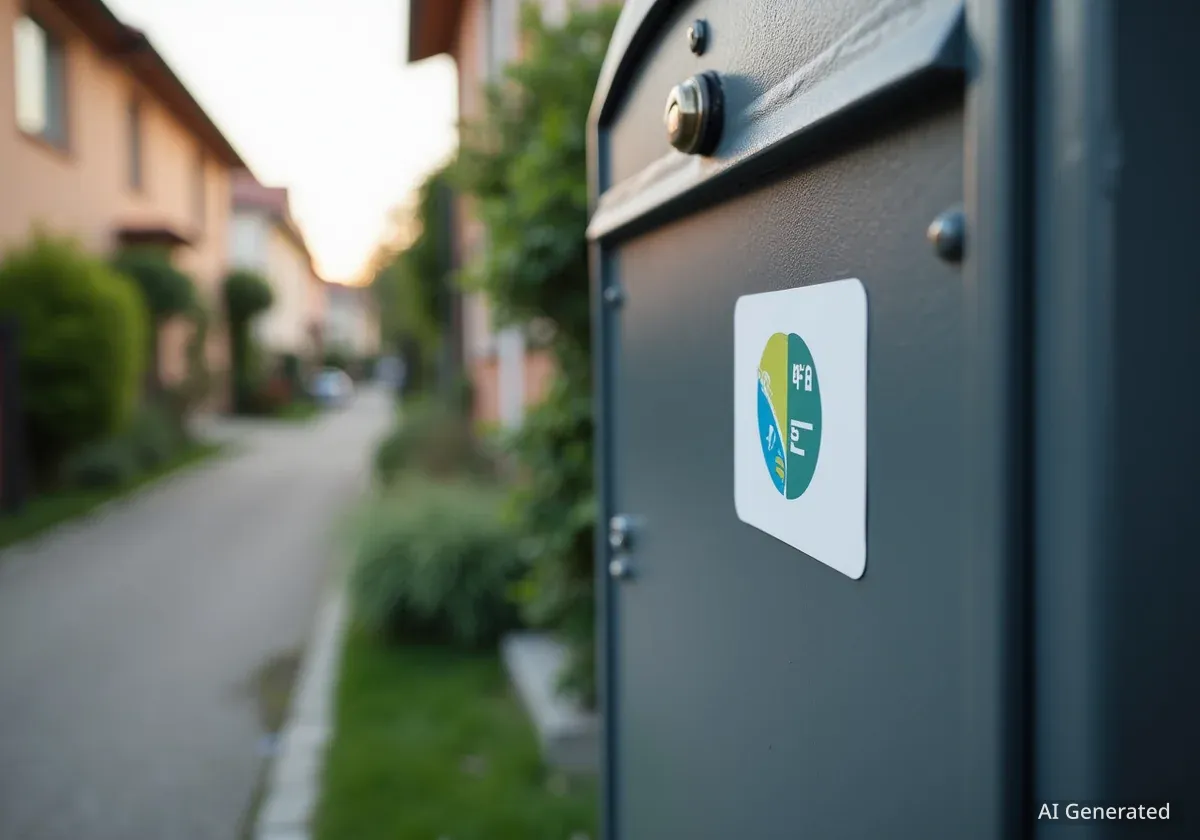A simple idea that started in Bern, Switzerland, is now connecting thousands of neighbors across Europe. The project, called Pumpipumpe, uses small stickers on mailboxes to show which household items residents are willing to share, from kitchen appliances to tools, fostering a culture of borrowing over buying.
What began as a local initiative in 2012 has grown into a network of over 24,000 households. Surprisingly, the city with the most participants is not its Swiss birthplace, but Berlin, Germany, where nearly 1,500 households have joined the movement to reduce waste and build stronger community ties.
Key Takeaways
- Pumpipumpe is a non-profit sharing initiative founded in Bern in 2012.
- Over 24,000 households in Europe participate by placing stickers on their mailboxes to indicate lendable items.
- Berlin has the highest number of users, with almost 1,500 participating households.
- The project aims to promote sustainability, reduce consumerism, and strengthen neighborhood connections.
- Tools and kitchen appliances are among the most frequently shared categories of items.
From a Bern Idea to a European Movement
Pumpipumpe was launched over a decade ago by three friends in Bern who wanted to address a common problem: many household items are owned but rarely used. They envisioned a simple, low-tech system to make these dormant objects available to others in the community.
The solution was a set of illustrated stickers. Each small sticker depicts an item, such as a drill, a cake pan, or a bicycle pump—the item that inspired the project's name. By placing these stickers on their mailboxes, participants signal to their neighbors that these items are available to borrow.
Co-founder Lisa Ochsenbein explained the core philosophy behind the project. "There are so many things we own but, on average, only use a few times in our lives," she said. The goal is to make better use of these items that often just gather dust in closets, attics, and basements.
A Dual Mission: Sustainability and Social Connection
Beyond the environmental benefits of reduced consumption, Pumpipumpe was founded with a strong social component. The act of borrowing an item creates a natural opportunity for neighbors to meet and interact, strengthening the fabric of local communities. Ochsenbein notes that the experience has been overwhelmingly positive, stating, "People are happy when they can help someone out with an item."
How the Sticker System Works
The project started with stickers for the most common rarely-used items. Early options included drills, extension cords, and fondue sets—a classic Swiss household item. The bicycle pump sticker was also an original, lending its playful name, "Pumpipumpe," to the entire initiative.
As the project's popularity grew, so did the variety of available stickers. Today, participants can choose from a catalog of 50 different illustrations. The selection now includes more specialized items like a disco ball, a child's car seat, or even a Halloween costume, reflecting the diverse needs of modern communities.
Expanding the Sharing Possibilities
To ensure the system remains flexible, the organizers also include blank stickers in each order. This allows people to draw or write in any item not covered by the standard illustrations. This feature has led to some creative and heartwarming offers of sharing.
"I have seen stickers with dogs on mailboxes," Ochsenbein shared, explaining that this was a friendly invitation for neighbors to offer to take the owner's dog for a walk.
A sheet of stickers can be ordered from the Pumpipumpe website for 7 Swiss Francs. According to Ochsenbein, the project operates as a non-profit association. The revenue generated from sticker sales is used to cover the costs of production and website maintenance. The shipping and handling of the stickers are now managed by a social enterprise based in Aargau, Switzerland.
Top Shared Items
While an exact count of borrowed items is not tracked, observations from the Pumpipumpe team indicate that certain categories are more popular than others. The most common stickers seen on mailboxes across Europe are for:
- Tools (drills, saws, screwdrivers)
- Kitchen Appliances (mixers, baking pans, fondue sets)
- Outdoor & Recreational Gear (tents, bicycles, sleds)
Bridging the Gap Between Analog and Digital
In its early days, Pumpipumpe was a purely analog system. If you needed a drill, you had to walk through your neighborhood, spot a sticker, and ring your neighbor's doorbell. While this face-to-face interaction is central to the project's mission, the founders recognized it could be a barrier for some.
"In Switzerland, it takes a certain amount of courage to ring a neighbor's doorbell and ask to borrow something," Ochsenbein observed, noting a cultural reluctance to feel like a burden to others.
To make participation easier, Pumpipumpe introduced a digital component. An interactive online map on their website allows users to register their address and list the items they are willing to share. Participants can also voluntarily add a phone number or email address, giving borrowers a less direct way to make the initial contact.
This hybrid approach allows shyer individuals to send a message first, while still encouraging the eventual in-person exchange that builds community.
The Psychology of Sharing in Switzerland
Despite the success of initiatives like Pumpipumpe, a broader cultural shift towards sharing in Switzerland faces challenges. A 2021 study on sharing behavior by the Lucerne University of Applied Sciences and Arts revealed a gap between theory and practice.
The study concluded that while many Swiss residents support the idea of a sharing economy, they often do not participate themselves. Key reasons for this hesitation include:
- A Sense of Independence: Owning an item, even if it is used infrequently, provides a feeling of autonomy.
- High Purchasing Power: In a country with a strong economy, it is often easy and affordable to simply buy a new item rather than borrow one.
- Fear of Damage: There is a common concern that a borrowed item might be damaged or broken by a neighbor.
Projects like Pumpipumpe work to overcome these hurdles by creating a low-risk, community-based framework. The simple sticker acts as a pre-approved invitation, removing the uncertainty of asking and signaling a household's openness to sharing.
While the project's promotional materials once playfully hinted at a romance blossoming over a borrowed cake pan, Ochsenbein humorously confirms that no such love stories have been reported back to them yet. "We are still waiting for the great love story," she concluded. For now, the focus remains on building friendships, one borrowed item at a time.




